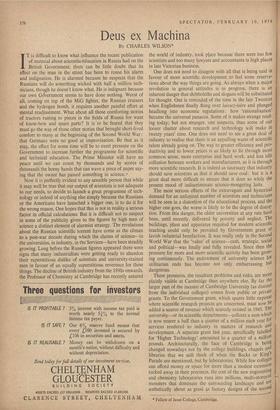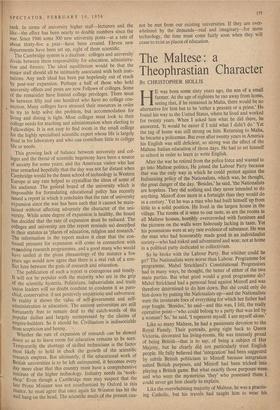Deus ex Machina
BY CHARLES WILSON* IT is difficult to know what influence the recent publication of material about scientific education in Russia had on the British Government; there can be little doubt that its effect on the man in the street has been to rouse his alarm and indignation. He is alarmed because he suspects that the Russians will do something wicked with half a million tech- nicians, though he doesn't know what. He is indignant because our own Gctvernment seems to have done nothing. Worst of all, coming on top of the MiG fighter, the Russian cruisers and the hydrogen bomb, it requires another painful effort at mental readjustment. What about all those comforting stories of tractors rusting to pieces in the fields of Russia for want of know-how and spare parts? It is 'to be feared that they must go the way of those other stories that brought short-lived comfort to many at the beginning of the Second World War : that Germans were no good at improvisation. Be that as it may. the effect for some time will be to exert pressure on the Government to increase further the programme for scientific and technical education. The Prime Minister will have no peace until we can count by thousands and by scores of thousands the horny hands that can wave a piece of paper say- ing that the owner has passed something in science.• Now it is perfectly evident to any sensible person that while it may well be true that our output of scientists is not adequate to our needs, to decide to, launch-a great programme of tech- nology or indeed of anything else simply because the Russians or the Americans have launched a bigger one, is to do it for the wrong reason. One hopes that this is not in reality a serious factor in official calculations. But it is difficult not to suspect in some of the publicity given to the figures by high men of science a distinct element of alarmist strategy. The revelations about the Russian scientific torrent have come as the climax to a post-war decade during which the claims of science—in the universities, in industry, in the Services—have been steadily growing. Long before the Russian figures appeared there were signs that many industrialists were getting ready to abandon their superstitious dislike of scientists and university-trained men in favour of an equally superstitious reverence for these things. The decline of British industry from the 1890s onwards, the Professor of Chemistry at Cambridge has recently assured the world of industry, took place because there were too few scientists and too many lawyers and accountants in high places in late Victorian business.
One does not need to disagree with all that is being said in favour of more scientific development, to feel some reserva- tions about the way things are going. As always when a major revolution in general attitudes is in progress, there is an inherent danger that shibboleths and slogans will be substituted for thought. One is reminded of the time in the late Twenties when Englishmen finally flung over laissez-faire and plunged headlong into economic regulations : how 'rationalisation' became the universal panacea. Some of it makes strange read- ing today; but not stranger, one suspects, than some of our looser chatter about research and technology will 'make in twenty years' time. One does not need to see a great deal of industry to realise that theie is an appalling waste of scientific talent already going on. The way to greater efficiency and pro- ductivity and to lower prices is as likely to lie through more common sense, more enterprise and hard work, and less idle collusion between workers and manufacturers, as it is through more scientific research. It is indeed as necessary that industry should save scientists as that it should save coal : but it is a great deal more difficult to ensure that it does so while the present mood of indiscriminate science-mongering lasts. The most serious effects of the extravagant and hysterical demand for an unlimited number of scientists and technicians will be seen in a distortion of the educational process, and the higher one goes, the worse is likely to be the degree of distor- tion. From this danger, the older universities at any rate have been, until recently, delivered by poverty and neglect. The buildings, plant and apparatus requiied for modern scientific teaching could only be provided by Government grant or lavish industrial benefaction. It was really only in the Second World War that the 'value' of science—cash, strategic, social and political—was finally and fully revealed. Since then the pressure for more and more scientific activity has been grow- ing continuously. The endowment of university science for utilitarian ends has become not only embarrassing but dangerous.
These pressures, the resultant problems and risks, are more plainly visible at Cambridge than anywhere else. By far the larger part of the income of Cambridge University (as distinct from the individual colleges) comes from public or private grants. To the Government grant, which spares little expense where scientific research projects are concerned, must now be added a source of revenue which scarcely existed in 1945. The university—or its scientific departments—collects a sum which is now nearer ,a half than a quarter of a million each year for services rendered to industry in matters of research and development. A separate grant last year, specifically labelled for 'Higher Technology' amounted to a quarter of a million pounds. Architecturally, the face of Cambridge is being changed nowadays not by the college buildings, chapels and libraries that we still think of when the Backs or Kings Parade are mentioned, but by laboratories. While few colleges can afford money or space for more than a modest extension tucked away in their precincts, the cost of the new engineering and chemistry laboratories runs into millions, multi-storeyed monsters that dominate the surrounding landscape and are, :esthetically about as good as factory designs of the second
• Fellow of Jesus College, Cambridge.
rank. In terms of university higher staff—lecturers and the like—the effect has been nearly to double numbers since the War. Since 1946 some 300 new university posts—at a rate of about thirty-five a year—have been created. Eleven new departments have been set up, eight of them scientific.
The Cambridge system is a dualism : colleges and university divide between them responsibility for education, administra- tion and finance. The ideal equilibrium would be that the senbr staff should all be intimately associated with both insti- tutions. Any such ideal has been put hopelessly out of reach by post-war expansion. Perhaps a half of those who hold university offices and posts are now Fellows of colleges. Some of the remainder have limited college privileges. There must be between fifty and one hundred who have no college con- , nection. Many colleges have strained their resources in order to try to help solve the problem, but accommodation for living and dining is tight. Most colleges must look to their college needs for teaching and administration when electing to Fellowships. It is not easy to find room in the small college for the highly specialised scientific expert whose life is largely lived in his laboratory and who can contribute little to college life or needs.
This growing lack of balance between university and col- leges and the threat of scientific hegemony have been a source of anxiety for some years; and the American visitor who last Year remarked hopefully that the day was not far distant when Cambridge would be the finest school of technology in Western Europe at any rate helped to crystallise the ideas of some of his audience. The general board of the university which is responsible for formulating educational policy has recently issued a report in which it concludes that the rate of university expansion since the war has been such that it cannot be main- tained without affecting adversely the character of the uni- versity. While some degree of expansion is healthy, the board has decided that the rate of expansion must be reduced. The colleges and university are (the report reminds us) described in their statutes as 'places of education, religion and research.' The information in the report makes it clear that the con- tinued pressure for expansion will come in connection with expanding research programmes. and a good many who would have smiled at the pious phraseology of the statutes a few years ago would now agree that there is a real risk of a con- flict here between the gods of research and education.
The publication of such a report is courageous and timely. It will not be popular with the majority who are in the grip of the scientific hysteria. Politicians, industrialists and trade union leaders will no doubt combine to condemn it as paro- chial, conservative, if not positively unpatriotic and subversive. In reality it shows the value of self-government and self- administration in education. The ancient universities are still fortunately free to remain deaf to the catch-words of the Popular dailies and • largely unimpressed by the claims of elnpire-builders. So it should be. Civilisation is indissociable from scepticism and heresy.
Whether the rate of expansion of research can be slowed down so as to leave room for education remains to be seen. Temporarily the shortage of skilled technicians is the factor most likely to hold in check the growth of the scientific research empires. But ultimately, if the educational work of British universities is to be left unimpaired, it becomes every day more clear that this country must have a comprehensive institute of the higher technology. Industry needs its `work- shop.' Even though a Cambridge man may suspect that the late Prime Minister was not uninfluenced by Oxford in this matter, he must agree that once again Sir Winston has hit the nail bang on the head. The scientific needs of the present can- not be met from our existing universities. If they are over- whelmed by the demands—real and imaginary-7for more technology, the time must come fairly soon when they will cease to exist as places of education.



































 Previous page
Previous page